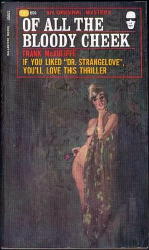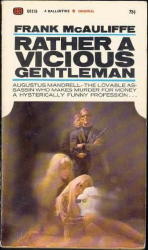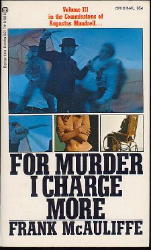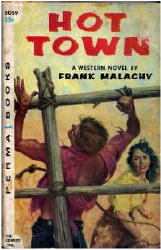Fri 29 Dec 2006
Always worthy of your attention is Peter Rozovsky’s Detectives Without Borders blog. In a recent posting, Peter compares and contrasts super-spy Peter O’Donnell’s Modesty Blaise with Frank McAuliffe’s super-hitman Augustus Mandrell. His primary thesis is that both characters came about as differing reactions to Ian Fleming’s super-successful James Bond, but that all three of these caper/spy heroes are essentially products of pure wish fulfillment.
Peter goes on to say more, including some conjectures about what a romantic interlude between Modesty Blaise and Augustus Mandrell might be like, but the wish fulfillment part is as right as the bank. One wonders, though, or at least I always have, why Frank McAuliffe’s books were never as successful as those of other two authors. In recent years the Mandrell books have become a cult favorite among those who happen to have copies of them, and sad to say, they are not always easy to find. Here’s a complete listing of McAuliffe’s novels and story collections, excerpted from Al Hubin’s Crime Fiction IV:
McAULIFFE, FRANK (Malachi) (1926-1986)
Of All the Bloody Cheek. Ballantine 1965, story collection. [Augustus Mandrell]
“The Dr. Sherrock Commission” ss
“The General LaCorte Commission” nv
“The Iranian Farmer Commission” nv
“The Scotland Yard Commission” nv

Rather a Vicious Gentleman. Ballantine 1968, story collection. [Augustus Mandrell]
“The American Mistress Commission” nv
“The Bullrusher Commission” nv
“The Irish Monster Commission” nv
“The Sealed Tomb Commission” nv

For Murder I Charge More. Ballantine 1971, story collection. [Augustus Mandrell]
“The American Apple Pie Commission” nv
“The Baseball Commission” nv
“The German Tourist Commission” nv
“The Hawaiian Volcano Commission” nv

The Bag Man. Zebra 1979
As Frank Malachy:
Hot Town (Permabooks, 1956)

A superb overview of the Mandrell stories can be found here, where Robert Wilfred Franson suggests that they should be read in order to get the full benefit from them. (Something I haven’t double-checked yet is whether all of the stories were original in the books or not. Nothing that I have found so far suggests that they aren’t, but there may be something I’ve missed.)
I don’t know anything about The Bag Man, and if you do, maybe you can help me out about it. In fact, I don’t believe I’ve ever even seen a copy of one. Trying to find one just a moment ago using www.bookfinder.com, not a single one turned up offered for sale.
Hot Town was published when McAuliffe was only 30, and in fact what it is, is a western novel. Since it is listed in CFIV, what it apparently is, is a western with strong criminous underpinnings. It also is fairly scarce, with only 5 or 6 showing up for sale, but this one I do happen to have a copy of. (And I did not know that it was written by McAuliffe until about maybe a minute and a half ago.) [UPDATE:01-01-07. Based on a comment left by Bob Franson, Al Hubin has decided to delete Hot Town from CFIV.]
The good news is that PointBlank is going to be reprinting some if not all of McAuliffe’s books. Allow me to quote from their website:
FRANK McAULIFFE (1926-1986) is the author of five previously published books. Of All The Bloody Cheek, Rather A Vicious Gentleman, For Murder I Charge More (the first three in the Augustus Mandrell series), Hot Town, and The Bag Man. Prompted by rumors of an unpublished fourth Mandrell novel, acclaimed mystery writers, Walter Satterthwait and Bill Crider contacted the author’s wife, Rita. (Incidently, her birth date, February 13th, is the one Augustus Mandrell perpetually refers to as “…that birth date, historically, of beautiful women…”) Through an uncanny chain of fortuitous events the manuscript was found, and will be published by PointBlank.
Frank McAuliffe was born the eldest of eight children to Irish immigrants, Con and Margaret McAuliffe in New York City, New York. He married Rita Gibbons and they had seven children together (Meg, Liz, Mark, Mary, Kate, Barbara, and Luke). After moving to Ventura, California, McAuliffe worked as a technical writer for the Navy, but spent most of his spare time writing fiction. In 1972 Frank McAuliffe was awarded the Edgar Allan Poe Award for his novel, For Murder I Charge More. Upon accepting the award for The Best Paperback Mystery of the Year, McAuliffe responded, “Ladies and Gentlemen, you have impeccably good taste.”
— The reason for the long delay in getting the fourth adventure of Augustus Mandrell published? McAuliffe submitted the manuscript of They Shoot Presidents, Don’t They? to his publisher just prior to death of President Kennedy, and the book was cancelled.
December 29th, 2006 at 9:17 pm
Thanks for the comment, though I’m not sure I would dignify my thoughts with the name of thesis. They were more like speculation, I’d say, or even pure whimsy in the matter of a possible carnal encounter between Mandrell and Blaise. It wasn’t prurience on my part, though. Sex is a definite part of the Mandrell books and of Modesty Blaise. In fact, I just may take that subject up on my blog. Sex sells; now perhaps I’ll see if it increases blog traffic as well.
I, too, have wondered why the Mandrell books have been less successful than some other series. About the only factor I can see working against them is that Mandrell’s attitudes toward woman are not always the most flattering. (I would note, though, that the women duped by Mandrell sometimes get the last word.)
Actually, another factor might militate against their widespread success: their wit and satire are just too good.
And thanks, too, for that information on McAuliffe’s non-Augustus Mandrell books.
===================
Detectives Beyond Borders
“Because Murder Is More Fun Away From Home”
http://detectivesbeyondborders.blogspot.com/
December 29th, 2006 at 9:41 pm
“McAuliffe submitted the manuscript of They Shoot Presidents, Don’t They?, to his publisher just prior to death of President Kennedy, and the book was cancelled.”
====
Hmm, so did McAufliffe write They Shoot Presidents, Don’t They? before the other three, which have pubication dates of 1965, 1968 and 1971? Perhaps it contains some of the heretofore unpublished commissions that Mandrell refers to throughout the three pubilshed books.
===================
Detectives Beyond Borders
“Because Murder Is More Fun Away From Home”
http://detectivesbeyondborders.blogspot.com/
December 30th, 2006 at 4:07 pm
Thanks for calling my review of the Augustus Mandrell series a “superb overview”!
I’ve read Frank McAuliffe’s Hot Town. The novel has vivid elements but is an apprentice work in comparison to his masterly Augustus Mandrell books. It didn’t strike me as especially criminous, more than an average Western with cattle rustlers and whatnot.
January 1st, 2007 at 7:47 pm
After a short three-way conversation between Al Hubin, Bob Franson and myself, Al has decided to delete Hot Town as an entry in Crime Fiction IV .
Here’s Bob’s additional description of the book that was the clincher;
Steve, Al:
The question: is “Hot Town” a crime or detection story?
Hmm. First, some qualifiers. I’m well aware of how classification bedevils bibliographers and thoughtful fans in general. And I am not an expert in crime fiction.
That said, “Hot Town” struck me as a typical Western of the action / adventure type. The hero has bad guys to unmask and fight, and
their skullduggery to dig out, but standard stuff. It did not occur to me that there was anything particularly mysterious or detectible in it, nor any crime that was exotic beyond that of a typical action Western.
There are some vivid scenes, but overall “Hot Town” does not work as well for me as an average Louis L’Amour novel. The wit and subtlety of the Mandrell books are not evident, nor is the focus on professional crime and its counter-measures.
Hope this helps!
Bob Franson
January 16th, 2007 at 8:04 pm
A 4th Augustus Mandrell book? Let me know when!! I have the first three, all of which I found by chance. I found the second one before I found the others, so I read them in this order – 2,1,3. I still re-read them and they are just as good the 3rd or 4th time as the first. I would hope that #4 is as good as the first three. Hitler as the President of a big corporation????
>>> I’m a little bit doubtful about that. If the fourth book was really the first book, only to be shelved after JFK assassination, I don’t think that Hitler is the President that They Shoot Presidents, Don’t They? is all about. My track record on surmises like this is far from perfect, though, not by a long shot. –Steve
January 17th, 2007 at 9:27 pm
I believe all the stories are original to the books, although they could have been published as episodes, or indeed still could be.
The first story, “The Dr. Sherrock Commission”, was reprinted in Alfred Hitchcock’s Mystery Magazine (AHMM) for September 2001. This issue also has a nice guest editorial about Augustus Mandrell by Walter Satterthwait.
One story doesn’t convey the flavor, and certainly not the first by itself. The series would be a great choice for a magazine to pick up, and run the whole thing.
August 31st, 2007 at 10:53 am
I knew Frank well. His brother Con taught with my professor father in San Diego, California. Frank personally gave me copies of all his books when I was 17. I read them each several times. He was a wonderful guy. I last saw him in early 1986 shortly before his death.
March 21st, 2012 at 2:24 pm
I am an avid fan of the A. Mandrell trilogy. I recently discovered a copy of “The Bag Man.” I paid $3.00 for it, but unfortunately I think I overpaid by about … $3.00.
November 17th, 2015 at 12:34 am
In 1971 Ballantine re-published the first two Mandrells in concert with the third; I bought them all at once. They had nicely uniform covers with clever photography, common typeface and style, and after years of study I realized the many pictures had been shot using only two male and one female models, plenty of costumes and wigs, lots of soft-focus, and a careful consideration of the actual texts.
I would posit their lack of success to the same reason I was uncomfortable with them: though stylishly written and cleverly plotted, the Mandrell stories are bleakly cynical and completely amoral. I was young enough then to be shocked by this.
Mandrell’s main targets may have been deserving of what he gave them, but the many minor characters who died (in black-humorous circumstances) for no reason other than giving inconvenience to the narrator was rather high, some of them were sympathetic (or at least innocent), and Mandrell’s attitude to them was just short of evil. I particularly remember some Allied investigator recounting how Mandrell was hired to off a German general; the RAF supplied a transport plane, and Mandrell’s on-board minder went missing: “All we found was his parachute!” The General subsequently died “in an accident” and payment was refused. Mandrell took his revenge somehow, I seem to remember.
I gave the books away to a friend who was a collector. I shall have to track this last one down and read it with an adult attitude.